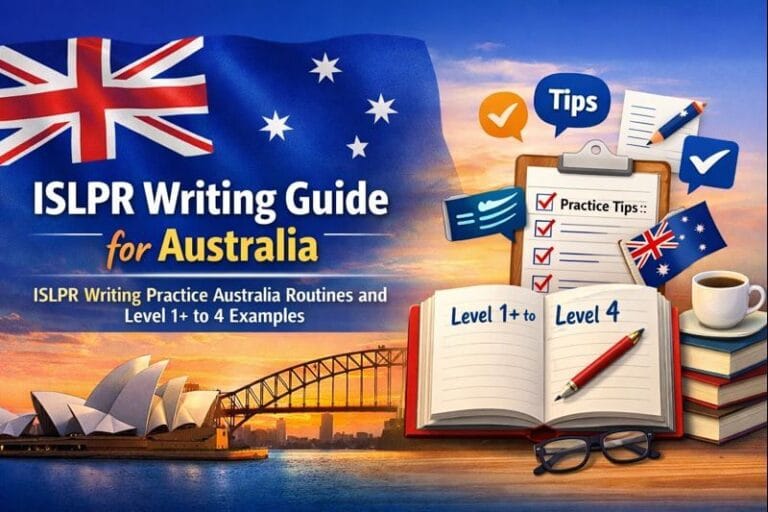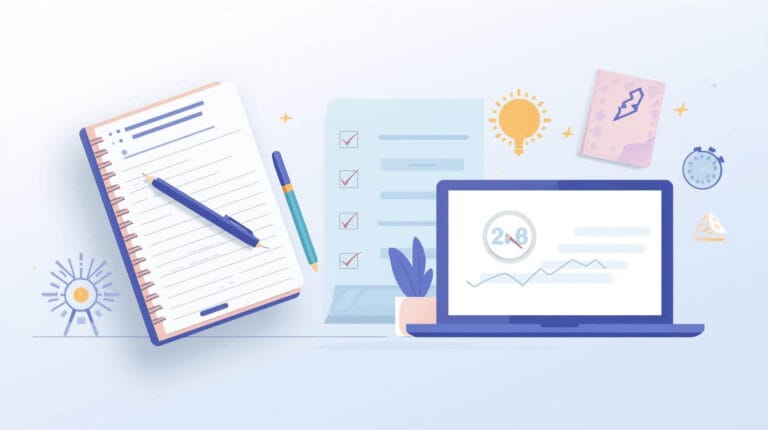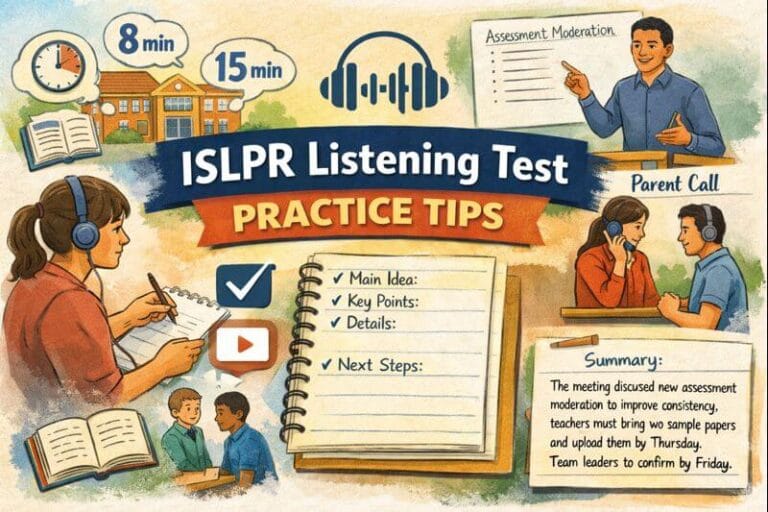Preparing for the International Second Language Proficiency Ratings (ISLPR) test can feel overwhelming, especially if you are new to Australia or are aiming to meet teacher registration or professional requirements.
While many candidates spend time revising grammar and vocabulary, one of the biggest challenges is the ISLPR Listening Test, which assesses how well you understand spoken English in real life Australian contexts.
The ISLPR Listening Test is not about simply hearing words. It measures how you interpret meaning, respond to different types of texts, and demonstrate your comprehension in a natural way.
This article outlines proven ISLPR listening test strategies that will help you prepare effectively and perform confidently on test day.
Preparation Before the Test
1. Engage with Native Speakers of English
One of the most effective ways to improve listening is to practise real conversations with a variety of people. Do not limit yourself to teachers or language tutors. Talk to shopkeepers, neighbours, co-workers, or even people you meet casually in the community. Each person has a different accent, pace, and vocabulary, and this variety will prepare you for the diversity of voices in the ISLPR Listening Test.
2. Listen to Public Announcements and Electronic Messages
Announcements at train stations, airports, shopping centres, or through automated systems are a powerful tool for training your ear. These short, information packed messages mirror the types of practical listening tasks you may face in the test. Take note of how speakers stress key words and how background noise can sometimes make listening harder. Regular practice with these announcements will sharpen your ability to capture essential details under pressure.
3. Explore Australian Media Daily
The ISLPR listening test preparation should include exposure to Australian English in different contexts.
- Radio: Use ABC Radio programs (www.abc.net.au) for a mix of interviews, debates, and news. Select topics related to your career or study area so that vocabulary becomes more familiar.
- Television: Watch news bulletins, documentaries, and Australian dramas. News helps you practise following facts, while dramas allow you to recognise emotions and informal expressions.
- Online: Access podcasts or live broadcasts through your phone or tablet. Listening live trains focus, while replays allow you to pause, rewind, and practise note-taking.
This strategy ensures you hear authentic Australian voices and cultural references, which is vital for ISLPR listening comprehension practice.
4. Practise Note-Taking Skills
Many candidates fail not because they do not understand but because they cannot remember key information. Develop a system for note-taking by writing down keywords, numbers, or symbols instead of whole sentences. Practise with short and long texts so that you are comfortable no matter the length of the recording. The ABC website is particularly useful for this practice, as it offers diverse content with transcripts for comparison.
Strategies During the Test
1. Handling Misunderstandings
It is natural to miss a word or sentence during the test. If this happens, do not panic. Pause briefly to see if the context makes it clearer. If not, politely ask the tester to repeat, rephrase, or explain. This demonstrates maturity as a listener. Candidates searching for “how to pass ISLPR listening test” often overlook this simple but powerful strategy.
2. Make Educated Guesses
The ISLPR exam values strategy over perfection. If you are unsure, make an informed guess based on context and say so honestly. Examiners are not only testing memory but also how you handle real life listening situations. Using this method shows resilience and comprehension strategies in action.
3. Paraphrase Instead of Repeating
The ISLPR listening task requires you to show understanding, not memorisation. Instead of repeating word for word, explain the message in your own words. This proves you can process and express meaning clearly. Many candidates preparing for the ISLPR listening test in Australia find this approach improves both confidence and marks.
4. Recognise Different Text Types
Different texts follow predictable structures:
- A news story will focus on new events or facts.
- A media interview will highlight the expertise or opinions of an interviewee.
Recognising these patterns helps you anticipate what comes next, making comprehension easier. This is a crucial ISLPR listening test strategy.
5. Ask About Context When Needed
Always consider where and when a text would normally be heard. If the test does not provide this information, ask the tester. Knowing the context, whether it is a workplace announcement or a radio broadcast, helps you interpret tone, style, and purpose more accurately.
6. Listen for Attitudes and Intentions
Speakers communicate not only information but also feelings, opinions, and purposes. In some tasks, the examiner may want you to explain the speaker’s attitude or intention. If you are unsure, clarify with the tester. This skill is especially important in ISLPR listening comprehension practice, where demonstrating deeper understanding earns higher ratings.
7. Take Notes Wisely
Deciding when to take notes is part of the strategy. For longer texts, jot down key points while listening. For shorter ones, it may be better to wait until the end. To manage this effectively, ask the tester about the length of the text beforehand. This will help you balance listening and writing without missing key information.
8. Use Prior Knowledge Without Relying on It
Sometimes you may already know about the topic being discussed. Use that knowledge to help you follow the text, but always focus on what the recording actually says. The examiner is assessing your comprehension of the text itself, not your background knowledge. This is a subtle but important part of ISLPR listening test preparation.
Conclusion
The ISLPR Listening Test is designed to reflect real life English use in Australia. Success comes not from memorising answers but from developing flexible strategies: talking to native speakers, listening to public announcements, exploring ABC programs, and practising note-taking. During the test, focus on understanding meaning, asking for clarification when needed, paraphrasing in your own words, and paying attention to context and attitudes.
By following these ISLPR listening test strategies, you will not only improve your performance but also gain confidence in everyday listening situations. With consistent practice and smart techniques, you can approach the exam prepared, assured, and ready to succeed.







